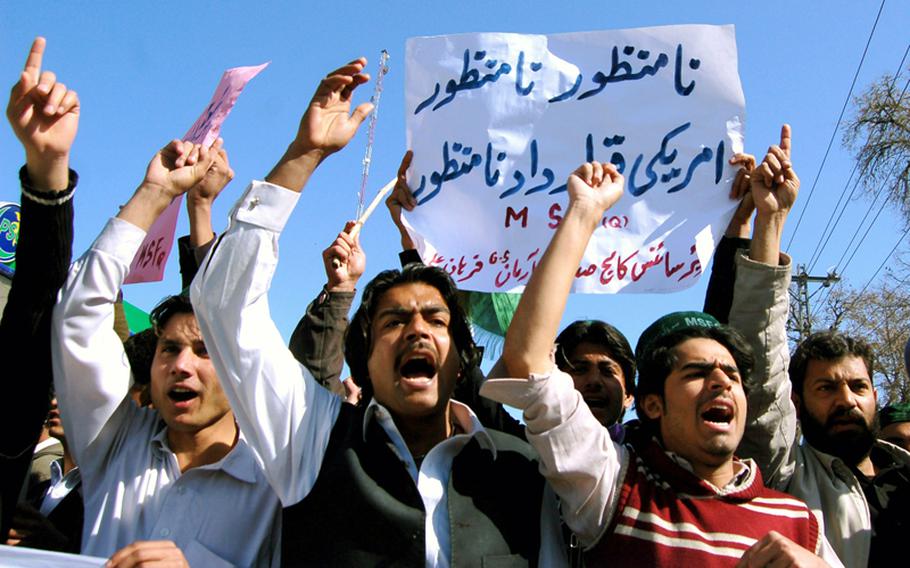Middle East
AnalysisQuran crisis reveals lack of awareness
Stars and Stripes February 26, 2012

Pakistani students shout slogans during a protest rally against Quran burning in northwest Pakistan's Peshawar area on February 22, 2012. (Ahmad Sidique, Xinhua-Zuma Press/MCT)
KABUL — Afghans seethed for a sixth day over the burning of Qurans at a U.S. base, and as the violence persists and the death toll rises, an unanswered question pulses at the heart of the crisis.
How could this happen?
The question pertains less to the specific decisions that led soldiers at Bagram Air Field to burn copies of the Quran than to why they even considered doing so, given the book’s sacredness to Muslims.
Davood Moradian, a former adviser to Afghan President Hamid Karzai, offered a pointed explanation.
“It’s the incompetence of ISAF,” he said, referring to the International Security Assistance Force, the U.S.-led coalition battling the Taliban insurgency.
“They have been here for more than 10 years and they still fail to understand the sensitivities of Afghanistan,” said Moradian, an assistant professor of political science at The American University in Kabul. “For Afghans, [burning the Quran] is an unacceptable, unforgivable incompetence.”
Their outrage remained evident Sunday. Seven U.S. military trainers were reported wounded when a protester threw a grenade into a coalition base during a demonstration in the northern province of Kunduz.
One protester was killed when troops fired on the crowd, and Afghan police killed a second demonstrator.
More than 30 people have been killed and hundreds injured across the country since reports emerged Tuesday that soldiers at Bagram burned several copies of the Muslim holy book.
The death toll includes two U.S. officers who were shot Saturday by an Afghan worker inside the Ministry of Interior building in Kabul. On Thursday, an Afghan soldier shot and killed two U.S. soldiers at a base in Nangarhar province.
As recently as the Persian Gulf War in 1991, U.S. infantry soldiers required little, if any, awareness of another nation’s religious customs. They invaded, they fought, they went home.
The prolonged U.S. presence in Afghanistan and the military’s mission to win the “hearts and minds” of Afghans have created expectations unknown to prior generations of soldiers.
“There is a lack of cultural understanding with the U.S. soldiers that should have been addressed by now,” said Waliullah Rahmani, executive director of the Kabul Center for Strategic Studies, a nonpartisan think tank. “With their constant rotations — the new units coming in every year — knowledge does not get passed on.”
As a result, Rahmani added, “Most of the soldiers here don’t know the Afghans or that they are a mostly religious people whose interpretation of the world is a religious one. They don’t understand that the reaction to the Quran burning is a natural Afghan reaction that comes from religious motivations.”
Muslims revere the Quran as the literal word of God spoken through the angel Gabriel to the prophet Muhammad.
“For [Christians], the Bible is a book and treated as such,” said Martine van Bijlert, co-director of the Kabul-based Afghanistan Analysts Network. “For Muslims, destroying the Quran is worse than civilian casualties.”
Desecration of the Islamic holy book has previously caused bloodshed in Afghanistan, most recently after a Florida pastor burned a Quran at his church last spring. Protesters in the northern city of Mazar-e-Sharif killed seven foreign workers during an attack on the United Nations compound.
The soldiers at Bagram removed copies of the Quran and other Islamic religious writings from the airfield’s detention facility and brought the materials to an incinerator for disposal. Detainees had written “extremist” messages in the Qurans, according to coalition officials.
U.S. Gen. John Allen, NATO’s commander in Afghanistan, apologized for the incident and ordered an investigation. He has also set a March 3 deadline for all coalition troops to receive training on the proper handling of religious materials.
The military provides a varying amount of instruction on Afghan religious and cultural customs to soldiers before they deploy based on their position and duties, said U.S. Gen. Lewis Boone, a NATO spokesman in Kabul.
Allen’s call for additional training suggests a realization that U.S. soldiers have yet to grasp the meaning of the Quran to Muslims.
“There has been a complete failure by ISAF to engage the clergy in Afghanistan,” said Moradian, of American University. “They have had years to work with the religious community here but there has been almost no progress.”
Fury over the burning of the holy texts has mushroomed despite Afghans acknowledging the soldiers might have acted out of ignorance rather than malice.
“Even if they did not mean it, what is the good of burning the Quran?” asked Ahmad Silam, 43, who runs a small shop in Kabul where he sells audio recordings of the Quran on CD and tape. He keeps his copy of the Quran, bound in black leather, on a corner shelf behind the front counter. “It is the word of God to us. It is wrong to destroy it.”
Anger toward Westerners in general and U.S. troops in particular has intensified in recent weeks among Afghans. A video that surfaced on YouTube last month showing four Marines urinating on the dead bodies of Taliban fighters drew criticism from Afghan and U.S. officials.
The burning of the Qurans, coupled with a national unemployment rate near 40 percent, a brutally cold winter and fatigue from a war in its second decade, have ignited a deadly frustration.
“Destroying the Quran shows disrespect to our religion and to Muslims,” Kaushal Hotak, 24, said as he marched in a protest last week in Kabul.
“We want to stop having such insults in our country because this is not the first or second time that [foreign troops] have disrespected us. It is time for them to leave.”
Zubair Babakarkhail contributed to this report.
Twitter: @martinkuz